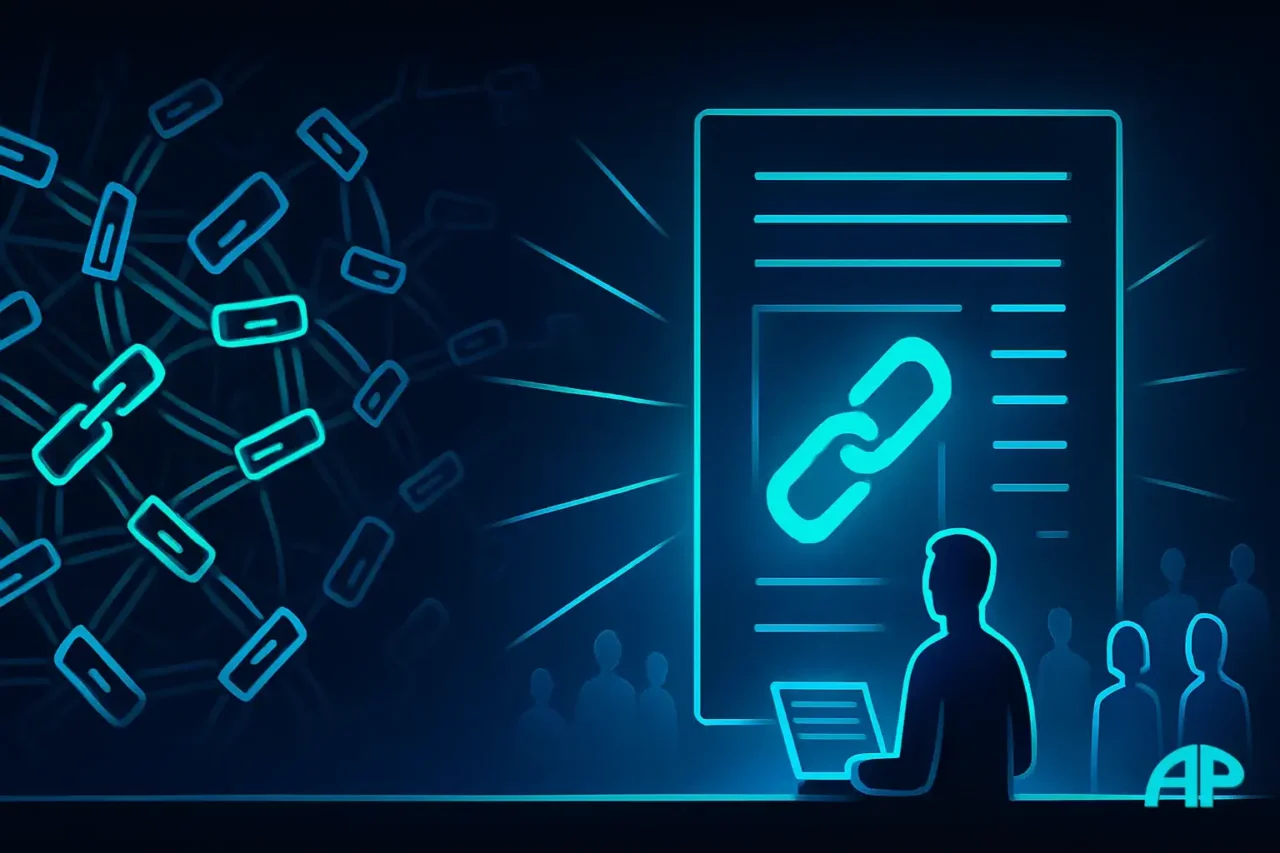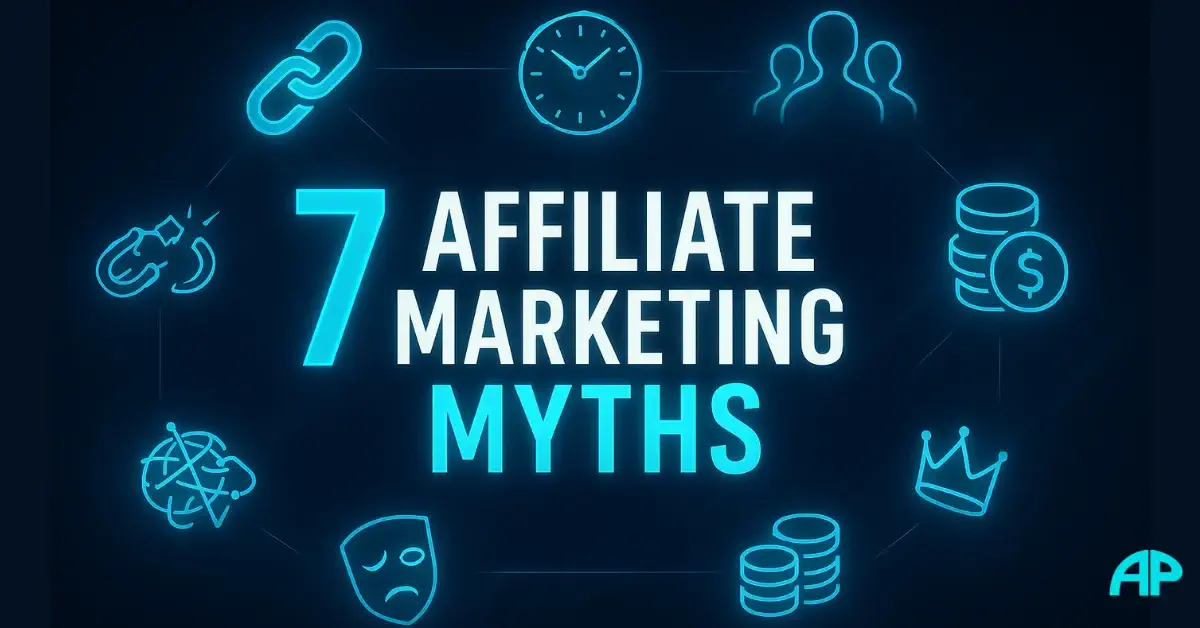Uncover the misconceptions that stop new affiliate marketers from making money.
Before we dig in, let’s map out the biggest affiliate marketing misconceptions so you can see exactly where an affiliate marketing beginner can go wrong.
Table of Contents
- Affiliate Marketing Misconceptions
- Myth #1 – Easy Money Trap
- Myth #2 – No Audience Needed
- Myth #3 – Skipping the Niche
- Myth #4 – Overnight Success
- Myth #5 – Trust Doesn’t Matter
- Myth #6 – More Links, More Sales
- Myth #7 – Only Experts Succeed
- FAQs on Affiliate Marketing
- Breaking Free From the Myths
Why Affiliate Marketing Misconceptions Keep Beginners Broke
Affiliate marketing looks simple.
- Drop a few links.
- Wait for the sales.
- Cash rolls in.
At least, that’s what the internet tells you.
But here’s the truth:
- Affiliate marketing does work.
- It has created real freedom for thousands of people.
- Yet beginners quit every day… broke, confused, frustrated.
Why?
Because they fall for the same traps over and over: affiliate marketing misconceptions.
These misconceptions:
- Create false expectations.
- Waste your time and money.
- Push you to quit before you’ve even started.
If you’ve ever wondered why your efforts aren’t working, the answer might not be you.
It might be the myths you’ve believed.
In this post, we’ll bust the most common misconceptions keeping beginners broke and reveal the truths that actually lead to success.
Myth #1 – Affiliate Marketing Is Easy Money
This is one of the most damaging affiliate marketing misconceptions.
The pitch is everywhere:
- “Set up a blog, throw in a few links, and watch the money roll in.”
- “Passive income in 30 days.”
- “No work required.”
Sounds great. But here’s the problem: it’s a lie.
Why this misconception keeps beginners broke:
- It sets you up for disappointment.
- You quit when the quick money doesn’t show up.
- You never build the systems that actually make affiliate marketing work.
The truth:
- Affiliate marketing is real business.
- It takes time to build trust, traffic, and authority.
- Smart affiliates treat it like a craft, not a lottery ticket.
Think about it:
- If it were that easy, wouldn’t everyone already be rich?
- The people selling “get rich quick” courses… are usually the only ones getting rich.
When you stop chasing shortcuts, you start building something real.
Myth #2 – You Don’t Need an Audience to Make Sales
Another common affiliate marketing misconception says:
- “Just grab your link and post it anywhere.”
- “The money will flow once people see it.”
- “No audience? No problem.”
But here’s the reality: without an audience, you’re invisible.
Why this misconception keeps beginners broke:
- No trust = no clicks.
- No traffic = no sales.
- Random links get ignored or flagged as spam.
The truth:
- Audience is everything.
- Even a small group of loyal followers can drive more sales than thousands of cold strangers.
- Building trust and attention takes time, but it pays off forever.
Examples of audience platforms:
- A blog with SEO-driven articles.
- A YouTube channel with helpful tutorials.
- An email list you own.
- A small but engaged social following.
Think about it:
- Would you buy from a stranger shouting in a crowd?
- Or from someone you trust who shows up consistently with value?
That’s why serious affiliates focus on building an audience — because an audience turns links into income.
Myth #3 – Anyone Can Succeed Without a Niche

This affiliate marketing misconception traps more beginners than almost anything else.
The belief:
- “Promote everything.”
- “The more products I push, the more money I’ll make.”
- “I don’t need to choose a niche.”
Sounds logical. But it’s a fast track to failure.
Why this misconception keeps beginners broke:
- Scattered focus confuses your audience.
- Google won’t rank you without clear authority.
- You never stand out in the sea of competition.
The truth:
- Niches create trust.
- Niches help you speak directly to a problem.
- Niches make people see you as the go-to person in that space.
Strong examples:
- Health (sub-niches: keto, gut health, men’s fitness).
- Wealth (sub-niches: affiliate marketing, investing, side hustles).
- Hobbies (sub-niches: photography, gardening, travel gear).
If you’re not sure how to pick the right one, check out this Affiliate Marketing Guide for Beginners. It walks you step by step through finding a niche that actually works.
Think about it:
- Who do you trust more — the person selling everything under the sun, or the one who clearly knows their space?
- The answer is obvious. And so is the path to profit.
Myth #4 – Success Happens Overnight
This is one of the most dangerous affiliate marketing misconceptions.
The promise:
- “You’ll be rich in 30 days.”
- “Just follow this secret formula.”
- “Push a button, and boom — passive income.”
It sounds exciting. But it’s not reality.
Why this misconception keeps beginners broke:
- You expect results too fast.
- When nothing happens in a month, you quit.
- You miss the compounding effect that only comes with consistency.
The truth:
- Affiliate marketing takes time.
- Most people see traction in 6–12 months, not 6–12 days.
- Content, SEO, trust — these grow slowly but pay off big over time.
Think about it:
- Would you trust someone who just showed up yesterday?
- Or someone who’s been showing up, giving value, for months?
Patience wins. Affiliate marketing isn’t a sprint. It’s a marathon where persistence beats hype every time.
Myth #5 – You Don’t Need to Build Trust
Another false belief in the world of affiliate marketing misconceptions says trust doesn’t matter.
The idea:
- “Just post the link.”
- “If the product is good, people will buy.”
- “No need to show your face or share your story.”
But here’s the truth: without trust, there are no sales.
Why this misconception keeps beginners broke:
- People ignore strangers who push products.
- Clicks without credibility don’t convert.
- Audiences see through hype instantly.
The reality:
- Trust is the real currency of affiliate marketing.
- Your audience buys because they believe you.
- Authenticity beats aggressive selling every time.
How to build it:
- Share honest experiences and results.
- Focus on helping, not just selling.
- Be consistent — show up even when you’re not pitching.
Think about it:
- Would you take advice from someone you don’t trust?
- Or would you follow the person who’s been transparent from day one?
The answer is obvious. Build trust, and the sales follow. Skip it, and you’ll stay broke.
Myth #6 – The More Links You Post, the More You’ll Earn

This affiliate marketing misconception sounds logical at first.
The belief:
- “More links = more chances.”
- “If I post everywhere, someone will click.”
- “It’s a numbers game.”
But reality says otherwise.
Why this misconception keeps beginners broke:
- Random links look like spam.
- People tune out when they see no context.
- Platforms ban or block you for link dumping.
The truth:
- One well-placed link can outperform 100 spammy ones.
- Context matters more than quantity.
- Value-driven content turns clicks into conversions.
Examples that work:
- A detailed review page with one affiliate link.
- A tutorial video where the link solves the problem.
- An email that shares value first, then recommends a product.
Think about it:
- Would you click a link stuffed in a random comment?
- Or a link inside helpful content that answered your question?
Less is more — when the “less” is relevant, trusted, and delivered at the right moment.
Myth #7 – Only Experts Can Make Money in Affiliate Marketing
This final affiliate marketing misconception stops countless beginners before they even start.
The belief:
- “You need years of experience.”
- “Only gurus make money online.”
- “If you’re new, you can’t compete.”
But here’s the reality: beginners succeed every day.
Why this misconception keeps people broke:
- It kills your confidence before you take action.
- You compare yourself to the top 1% and give up.
- You never discover that momentum comes from starting, not waiting.
The truth:
- Everyone starts as a beginner.
- Success comes from learning, testing, and staying consistent.
- Gurus weren’t gurus when they began — they were just people who didn’t quit.
Think about it:
- Every successful affiliate once had zero knowledge.
- What made them different? They took action while others hesitated.
You don’t need to be an expert to start. You just need the courage to begin and the persistence to keep going.
Frequently Asked Questions About Affiliate Marketing Misconceptions
Is affiliate marketing really profitable?
Yes. Affiliate marketing is a proven business model that generates billions each year. But falling for affiliate marketing misconceptions keeps beginners broke. Profit comes when you focus on building trust, traffic, and real value instead of chasing shortcuts.
How long does it take to succeed in affiliate marketing?
Most beginners see results in 6–12 months if they’re consistent. Success doesn’t happen overnight. The idea that affiliate marketing is fast money is one of the most common misconceptions.
Do I need a website to start affiliate marketing?
Not strictly. Some people begin on YouTube, TikTok, or email. But having your own website is highly recommended. It builds authority, gives you control, and helps you avoid the “platform risk” that comes with relying on social media.
What are the most common affiliate marketing misconceptions?
Some of the biggest ones include:
- Affiliate marketing is easy money.
- You don’t need an audience.
- You can succeed without a niche.
- Success happens overnight.
- Trust doesn’t matter.
- The more links you post, the more you’ll earn.
- Only experts can succeed.
Avoid these misconceptions, and you’ll be way ahead of most beginners.
Conclusion: Breaking Free From Affiliate Marketing Misconceptions
Affiliate marketing works. But the reason so many beginners stay broke isn’t the model — it’s the affiliate marketing misconceptions they believe.
These misconceptions create false hope:
- Easy money.
- Overnight success.
- No need for an audience, a niche, or trust.
The result? People quit before they’ve given themselves a fair chance.
The truth is simpler, but less flashy:
- Affiliate marketing takes time.
- You need focus, patience, and consistency.
- It’s a real business, not a quick fix.
If you ignore the noise and stick to proven strategies, you can succeed. Many beginners have already done it — and so can you.
So here’s the challenge: stop chasing misconceptions. Start building something real. Because once you do, affiliate marketing stops being hype and starts being freedom.


